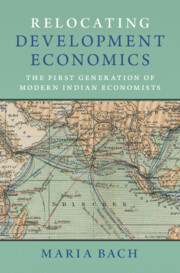Book contents
- Relocating Development Economics
- Historical Perspectives on Modern Economics
- Relocating Development Economics
- Copyright page
- Dedication
- Contents
- Figures
- Tables
- Acknowledgements
- 1 Introduction: Relocating Development Economics
- 1 The Context
- 2 The Beginnings of Indian Economics
- 3 Stages of Civilisation
- 4 Regress
- 5 Developing Balanced Growth at Home
- 6 A Global Win–Win Model for Development
- Epilogue: Multiple Definitions of Progress and Development
- References
- Annex I Archival Sources – Major Works of the First Generation of Modern Indian Economists, 1870–1905
- Index
- Other Books in the Series (continued from page ii)
Epilogue: Multiple Definitions of Progress and Development
Published online by Cambridge University Press: 05 December 2024
- Relocating Development Economics
- Historical Perspectives on Modern Economics
- Relocating Development Economics
- Copyright page
- Dedication
- Contents
- Figures
- Tables
- Acknowledgements
- 1 Introduction: Relocating Development Economics
- 1 The Context
- 2 The Beginnings of Indian Economics
- 3 Stages of Civilisation
- 4 Regress
- 5 Developing Balanced Growth at Home
- 6 A Global Win–Win Model for Development
- Epilogue: Multiple Definitions of Progress and Development
- References
- Annex I Archival Sources – Major Works of the First Generation of Modern Indian Economists, 1870–1905
- Index
- Other Books in the Series (continued from page ii)
Summary
Some ideas get less attention than others. And as much as intellectuals may want to believe that an idea spreads, and only spreads, if it gets us closer to the truth, that is not the only reason an idea may be taken up and circulated. An intellectual’s class, caste, gender, nationality, physical location, time period and so forth radically affects whether the knowledge they produce will be read, accepted and passed on. Knowledge creation, in modern science and especially economics, is notoriously focused on western European and North American intellectuals. There seems, in other words, to be boundaries that define who can produce knowledge. I have questioned those boundaries throughout this book, to uncover marginalised economists that are seldomly analysed. The first generation of modern of Indian economists is a good example of marginalised thinkers. They worked within an imperial setting and were treated as inferior, while their addressees, mainly British, were considered superior. The Indian economists were thus producing economic knowledge from the margins. As such, the Indian economists often got – and still get – labelled as copiers of existing knowledge from Europe and North America. The imperialist context created a blindness to original Indian thought. Within the history of ideas, and more specifically the history of economics, studies are predominately about well-known figures such as Adam Smith and David Ricardo, while lesser-known figures are rarely cited or analysed. Expanding the history of economics, which this book is only one example, provincialises well known economic theories like economic development and provides perspectives often either ignored or critiqued and quickly forgotten. Relocating Development Economics exposes new ideas not previously taken seriously.
- Type
- Chapter
- Information
- Relocating Development EconomicsThe First Generation of Modern Indian Economists, pp. 151 - 160Publisher: Cambridge University PressPrint publication year: 2024

